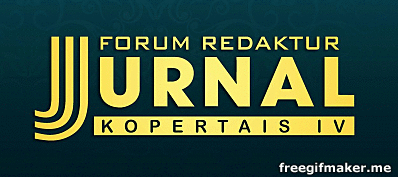TA’DIB SEBAGAI UPAYA REKONSTRUKSI PENDIDIKAN ISLAM PERSPEKTIF SYED NAQUIB AL-ATTAS
Abstract
of Syed Muhammad Naquib al-Attas on the fundamental concepts of Islamic education is the concept of ta'dib. For him the most fundamental issues in Islamic education is the loss of civilized values in a general mean. This is more due to the confusion of understanding in the term of tarbiyah, ta’lim dan ta’dib. Al-Attas is more likely to use the term ta'dib to the concept of Islamic educationbecause if the concept of ta’dib is applied in a comprehensive, integral, and systematic practice of Islamic education, the various human resource development issues Muslims are expected to be overcome. Moreover, in Islamic history Muslim educational process is more likely to sense ta'dib than tarbiyah or ta’lim. More fundamental reason is closely related to the science of manners, because science can not be taught or transmitted to students unless the person had the proper culture to knowledge in various fields. The concept of Islamic education is only limited to the meaning tarbiyah and ta’lim have been possessed by the Western worldview based on the values of dualism, secularism, humanism, and Sufism so civilized values become increasingly blurred and increasingly distant from the values of hikmah Ilahiah. Ambiguity civilized values or civilized destruction resulted in injustice, ignorance, and insanity.References
Abidin, Zainal. The Problem of Devinition in Islamic Logic: A Study of Abu Al-Naja Al-Faridh’s Kasr Al-Manthiq in Comparison with Ibn Taymiyyah’s Kitab Al-Radd’ala Al-Manthiqiyyin, seri tesis master ISTAC jil. 1, KL: ISTAC, 1997.
Ahmed, Akbar S. Postmodernism and Islam: Predicament and promise, London dan New York: Routledge, 1992.
Al-Baihaqi, Abu Bakr Ahmad. Kitab Al-Sunan Al-Kubra, 10 jil. (Beirut: Dar Al-Ma’rifah, t.t.
Al-Attas, Muhammad al-Naquib. Konsep Pendidikan dalam Islam. Bandung: Mizan, 1994.
_______. The Concept of Education in Islam. Kuala Lumpur: ABLM, 1980.
_______. Islam dan Filsafat Sains. Bandung: Mizan, 1995.
_______. Islam dan Sekularisme. Jakarta: Pustaka, 1991.
_______, Dilema Kaum Muslimin cet.1.Surabaya : PT. Bina Ilmu,1986
Al-Attas, Syed Farid, “Agama dan Ilmu-Ilmu Sosialâ€, Jurnal Ulumul Qur’an, jil. 5, No. 2, 1994.
Al-Faruqi, Ismail R. Islamisasi Ilmu Pengetahuan. Bandung: Pustaka, 1984.
_______. Islamizing The Social Sciences. In Social Natural Sciences: The Islamic Perspective. Ismail Raji Al-Faruqi and Abdullah Omar Nasseef (ed.). Jeddah: King Abdulaziz University. 1981.
Bernstein, Richard J. Beyond Objectivism and relativism: Science, Hermeneutics, and Praxis, Philadelphia: University of Pennsylvania Press, 1988.
Daud, Wan Mohd Nor Wan, Filsafat dan Parktik Pendidikan Islam Syed Muhammad Naquib Al-Attas, Bandung: Mizan, 1998.
Jarret, James L. The Educational Theories of The Shopists. Classics in Education New York: Theachers College Press Columbia University, 1969.
Nashr, Sayyed Hossen. Science Civilization in Islam. New York : Mentor Books, 1970.
______,The Essential Writings of Frithjof Schuon New York: Amity House, 1986
______,The Need for a Sacred Science. Richmond: Curzon Press. 1993.
Rorty,Richad. Philosophy and the mirror of nature Princeton:Princeton University Press, 1980
Huston Smith, Huston. “postmodernism and the Worl’d religionsâ€, dalam Islam and the Challenge of Modernity: Proceedings of the Inaugural Symposiumon Islam and the Challenge of modernity-Historical and Contemporary Contexs, Kuala Lumpur, august 1-5, 1994,.
Copyright (c) 2016 Al Hikmah: Jurnal Studi Keislaman

This work is licensed under a Creative Commons Attribution 4.0 International License.
Hak Cipta dari artikel yang diterima oleh Al Hikmah: Jurnal Studi Keislaman bisa disebarkan untuk publik





